Skip to content
Musk could face DSA fines of up to 6% of global revenue—including SpaceX sales.

Credit: Getty Images | NurPhoto
European Union regulators warned Elon Musk's X platform that it may calculate fines by including revenue from Musk's other companies, including SpaceX, according to a Bloomberg article published today.
X was previously accused of violating the Digital Services Act (DSA), which could result in fines of up to 6 percent of total worldwide annual turnover. That fine would be levied on the "provider" of X, which could be defined to include other Musk-led firms.
Bloomberg writes that "regulators are considering whether sales from SpaceX, Neuralink, xAI and the Boring Company, in addition to revenue generated from the social network, should be included to determine potential fines against X, people familiar with the matter said, asking not to be identified because the information isn't public." Bloomberg's report says that Tesla "sales would be exempt from this calculation because it's publicly traded and not under Musk's full control."
"In considering revenue from his other companies, the commission is essentially weighing whether Musk himself should be regarded as the entity to fine as opposed to X itself," Bloomberg's sources say.
Such a move would significantly increase potential fines, particularly given X's struggles in the advertising business. Brazil has already treated Musk-led companies as a single economic group and seized about $2 million from a Starlink bank account to cover X's fines.
Defining “provider”
An EU spokesperson told Ars today that "the provider of X is responsible for complying with the obligations of the DSA. Fines are calculated on the basis of the total worldwide annual turnover of the provider. It is only necessary to definitively identify the provider of a very large online platform at the stage of a final decision."
The EU statement provided to Ars hints at the leeway regulators have in defining "provider."
"The obligations under the DSA are addressed to the provider of the very large online platform or very large online search engine," the EU statement said. "This applies irrespective of whether the entity exercising decisive influence over the platform or search engine is a natural or legal person.
In July, the European Commission announced its preliminary finding that X violated the Digital Services Act because Musk's overhaul of the Twitter verification system deceives users.
X "designs and operates its interface for the 'verified accounts' with the 'Blue checkmark' in a way that does not correspond to industry practice and deceives users," the EU regulator said at the time. "Since anyone can subscribe to obtain such a 'verified' status, it negatively affects users' ability to make free and informed decisions about the authenticity of the accounts and the content they interact with. There is evidence of motivated malicious actors abusing the 'verified account' to deceive users."
Musk vowed “very public” court battle
The EU also alleged violations of rules requiring transparency in advertising and access to data for researchers. The process allows X to respond before a final decision, and Musk has vowed to fight any penalties through "a very public battle in court so that the people of Europe can know the truth."
When the preliminary finding was announced, EU Commissioner for Internal Market Thierry Breton chided Musk for diminishing the importance of blue checkmarks, saying the icons on verified accounts "used to mean trustworthy sources of information." Breton has since resigned.
"After Breton resigned in September, he bequeathed his fining powers to competition and digital boss Margrethe Vestager. Decisions on the penalties and how they are calculated would ultimately lie with Vestager," Bloomberg wrote. The European Commission would have the final say.
"The commission hasn't yet decided whether to penalize X, and the size of any potential fine is still under discussion," Bloomberg wrote, citing its anonymous sources. "Penalties may be avoided if X finds ways to satisfy the watchdog's concerns."
X says SpaceX revenue should be off-limits
Although X faces potential DSA fines, it will avoid penalties under the EU's Digital Markets Act (DMA). The European Commission announced yesterday that X does not "qualify as a gatekeeper in relation to its online social networking service, given that the investigation revealed that X is not an important gateway for business users to reach end users."
But documents related to the DMA probe of X raise the possibility of treating multiple Musk-led companies as a single entity called the "Musk Group" for compliance purposes. In a March 2024 letter to Musk and X Holdings Corp., "the Commission set out its preliminary views on the possible designation of Mr. Elon Musk and the companies that he controls ('the Musk Group') as a gatekeeper," according to a document signed by Breton.
X has argued that it wouldn't make sense to include Musk's other companies in revenue calculations when issuing penalties. "X Holdings Corp. submits that the combined market value of the Musk Group does not accurately reflect X's monetization potential in the Union or its financial capacity," the document said. "In particular, it argues that X and SpaceX provide entirely different services to entirely different users, so that there is no gateway effect, and that the undertakings controlled by Mr. Elon Musk 'do not form one financial front, as the DMA presumes.'"
We contacted X and SpaceX today and will update this article if they provide any comment.
Jon is a Senior IT Reporter for Ars Technica. He covers the telecom industry, Federal Communications Commission rulemakings, broadband consumer affairs, court cases, and government regulation of the tech industry.
